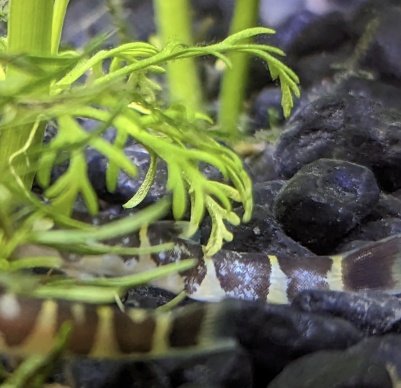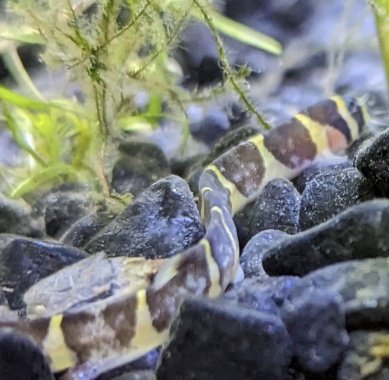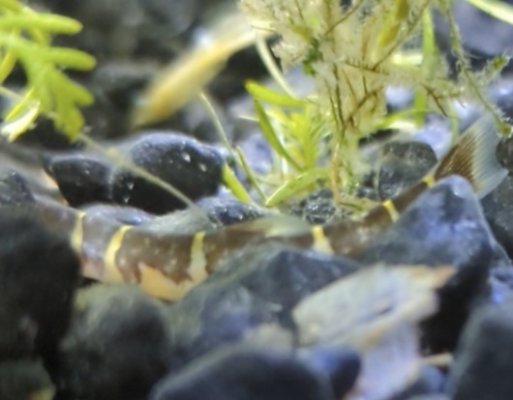Hi there, I have a Kulhi loach I'm worried about at the moment, it has some white spots along it's back and sides and is the only loach in our tank that has this. We're new to aquarium keeping and I'm wanting to know what we can do to help our little loach here! I've attached some images that Ive gotten of it today. Is this ich? Or is this damage to the skin of the loach from the gravel we have in the tank?
What type of fish is afflicted? In addition, please describe what is wrong with the fish to the best of your ability (i.e. cotton like growth, bloated, etc.).
One Kulhi loach has white spots over it's sides, not really just tiny dots but larger white areas, I'll attach some pics of it that I got today... We are planning to remove most of the gravel and replace it with sand for them to dig in and to not damage their skin some time this week, but is this damage already? Or is this an illness?
What are your tank parameters (ammonia, nitrites, nitrates, temp, pH)? Please give exact values.
0 ammonia, 0.5 nitrites, 5.0 nitrates, 24 c, 7.2 pH
How large is the tank? How long has the tank been set up?
36L tank than has been set up just over a month now, still going through a cycle and testing parameters daily.
What type of filtration are you using?
Using an internal filter with sponges and bio media, not quite sure the gph.
How many fish are in the tank? What kinds of fish are they and what are their current sizes?
Four Kulhi Loaches, two honey gouramis and three guppy's (two adults, one juvenile, half an inch)
When is the last time you did a water change and vacuum the gravel? How often do you do this? How much water do you remove at a time?
Changed water yesterday and two days ago. We're still going through a fish-in cycle and have no ammonia but some levels of nitrites that we're doing partial water changes for, usually about 25% at a time. We have some mess in the gravel between the plants that we haven't vacuumed up, and they like to hang around in the dense plants if that is related to this!
How long have you had the fish? If the fish is new, how did you acclimate it/them?
Had them for two weeks now, we just sat them in the water in their bag for half an hour then placed them in.
Have you added anything new to the tank--decor, new dechlorinator, new substrate, etc.?
Some river stones from a local fish store stacked to make small caves for the loaches. We have added two honey gouramis and the adult female guppy just four days ago now.
What kind of food have you been feeding your fish, have you changed their diet recently?
Mainly JBL Novotabs broken in to small portions every other day and small amounts of fish flakes that have fallen to the bottom from the other fish
What type of fish is afflicted? In addition, please describe what is wrong with the fish to the best of your ability (i.e. cotton like growth, bloated, etc.).
One Kulhi loach has white spots over it's sides, not really just tiny dots but larger white areas, I'll attach some pics of it that I got today... We are planning to remove most of the gravel and replace it with sand for them to dig in and to not damage their skin some time this week, but is this damage already? Or is this an illness?
What are your tank parameters (ammonia, nitrites, nitrates, temp, pH)? Please give exact values.
0 ammonia, 0.5 nitrites, 5.0 nitrates, 24 c, 7.2 pH
How large is the tank? How long has the tank been set up?
36L tank than has been set up just over a month now, still going through a cycle and testing parameters daily.
What type of filtration are you using?
Using an internal filter with sponges and bio media, not quite sure the gph.
How many fish are in the tank? What kinds of fish are they and what are their current sizes?
Four Kulhi Loaches, two honey gouramis and three guppy's (two adults, one juvenile, half an inch)
When is the last time you did a water change and vacuum the gravel? How often do you do this? How much water do you remove at a time?
Changed water yesterday and two days ago. We're still going through a fish-in cycle and have no ammonia but some levels of nitrites that we're doing partial water changes for, usually about 25% at a time. We have some mess in the gravel between the plants that we haven't vacuumed up, and they like to hang around in the dense plants if that is related to this!
How long have you had the fish? If the fish is new, how did you acclimate it/them?
Had them for two weeks now, we just sat them in the water in their bag for half an hour then placed them in.
Have you added anything new to the tank--decor, new dechlorinator, new substrate, etc.?
Some river stones from a local fish store stacked to make small caves for the loaches. We have added two honey gouramis and the adult female guppy just four days ago now.
What kind of food have you been feeding your fish, have you changed their diet recently?
Mainly JBL Novotabs broken in to small portions every other day and small amounts of fish flakes that have fallen to the bottom from the other fish



